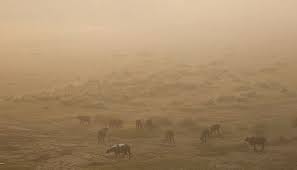
News Desk
NEW DEHLI: Delhi’s deteriorating air quality has reached alarming levels this week, prompting renewed calls for artificial rain to curb pollution. Environment Minister Gopal Rai expressed urgency on Tuesday, asking the federal government to approve cloud-seeding efforts to alleviate the crisis. Rai noted that air quality index (AQI) scores have hit around 400 in the capital and surrounding areas, marking “severe” pollution levels that jeopardize respiratory health.
Rai urged the federal environment minister to expedite support, citing the critical need to address the rising haze over the next ten days. The worsening air quality is part of a broader public health issue across South Asia. The University of Chicago’s Air Quality Life Index previously indicated that pollution could reduce life expectancy by over five years in the region. This week, Swiss air quality firm IQAir listed Delhi as the world’s second most polluted city, behind Lahore in Pakistan.
Lahore, facing similar challenges, enacted emergency measures after its own AQI reached unprecedented levels. In response, the Punjab government in Pakistan attributed part of the pollution problem to cross-border drift from India, committing to raise the issue diplomatically. Winter in north India regularly sees an upswing in pollution levels as colder air traps particulate matter, emissions, and crop-burning smoke from the agricultural states of Punjab and Haryana.
This seasonal trend blankets Delhi in a dense, toxic haze, and following Diwali last week, the city’s air quality took a severe hit with residents ignoring firecracker bans. Consequently, air quality scores at one-third of Delhi’s 39 monitoring stations surpassed 400 on Tuesday, affecting healthy individuals and posing significant risks for those with respiratory conditions.



